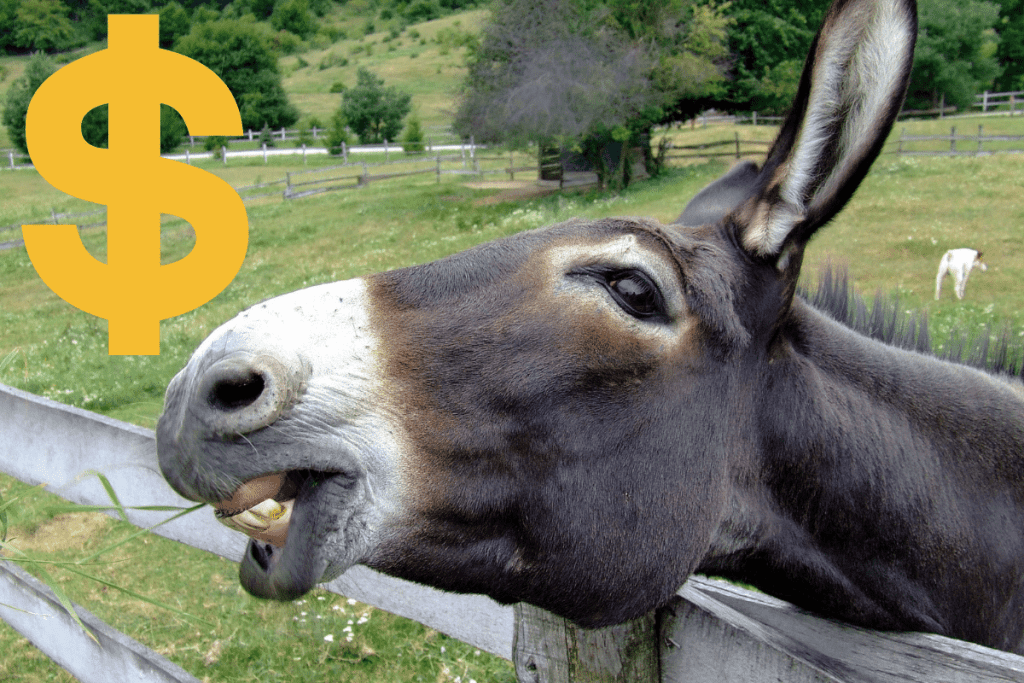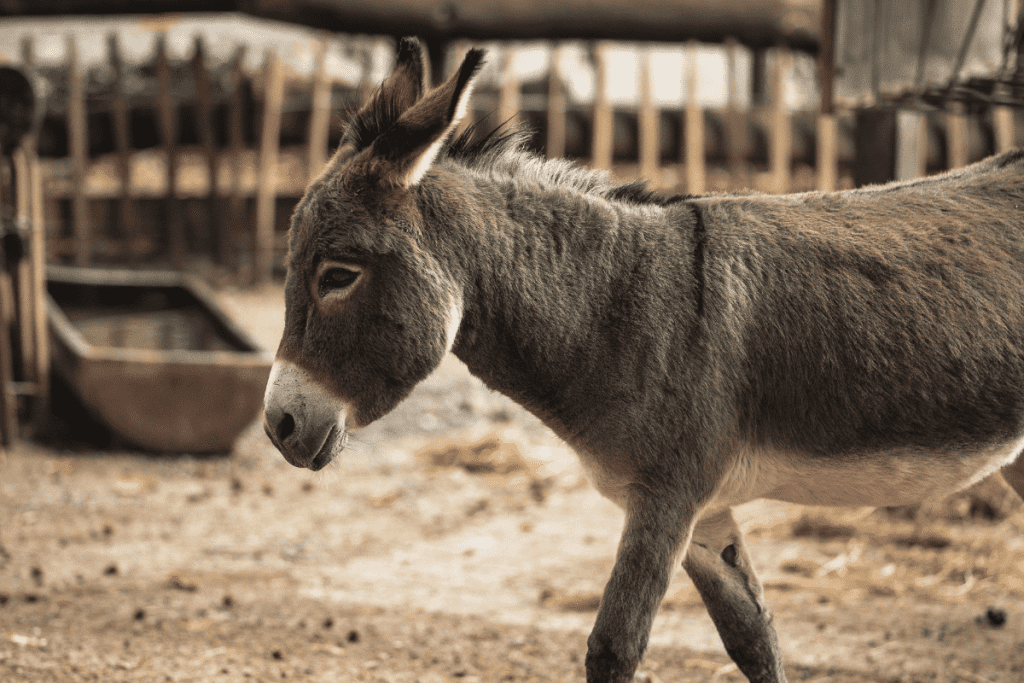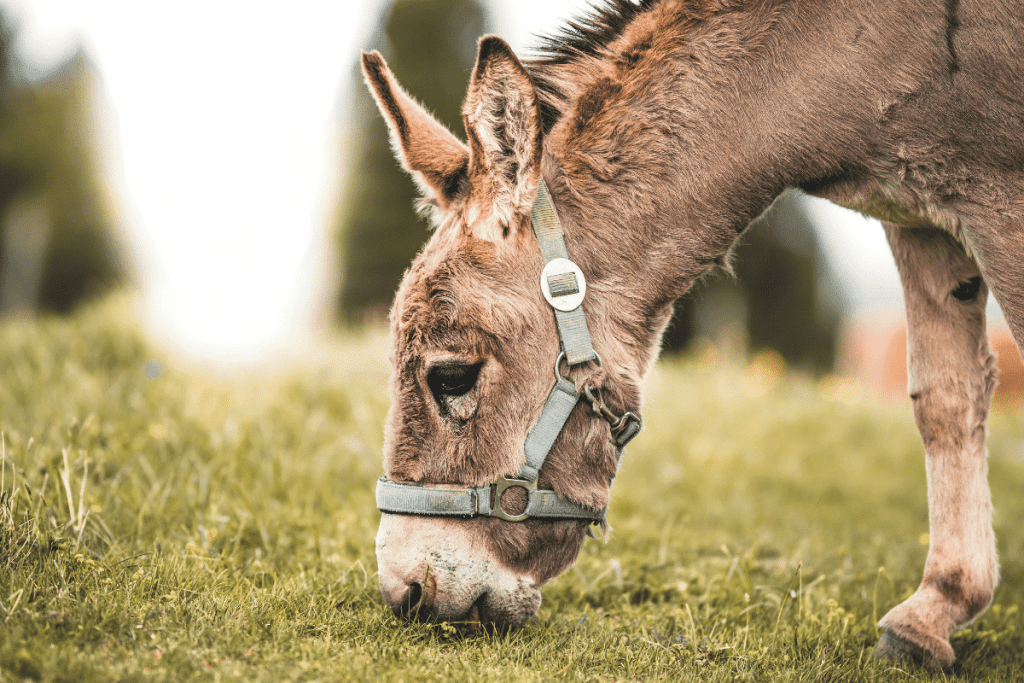Adding a donkey to your pasture or farm is a significant investment of both time and money, but it is a very rewarding experience.
Donkeys are:
- Highly intelligent animals.
- Making them a great choice for pasture pets.
- Guardians for livestock.
- Even companions for horses.
While a donkey is not as expensive as a horse, several one-time and ongoing costs are involved.
So what are some expenses you need to consider when purchasing a donkey?
On average, the purchase price of a donkey ranges anywhere from $100 to $3,000 or more. If you do not already have a barn or fencing, you must account for those expenses. There are also ongoing expenditures with donkey ownership, including feeding, grooming, veterinary, and farrier costs.
Many donkeys are also sold as bonded pairs, which means you will need to double your ongoing expenses.
A donkey is a social animal and enjoys having a companion, reducing the chances of any stress-related health issues.
Keep reading for a complete breakdown of the expenses associated with owning a donkey.

Table of Contents
ToggleWhat Affects The Price Of A Donkey?
Many factors influence the purchase price of a donkey, including:
- Age
- Color
- Gender
- Breed
- Training
Where you purchase your donkey will also affect the price.
It is usually much cheaper to pay to adopt a donkey rather than buy one from a breeder.
Depending on where you live, buying a donkey may be more expensive as well.
Below, we detail how each of these factors influences the price of a donkey.
Size
Donkeys are available in miniature, standard, and mammoth sizes.
Miniature donkeys are less than 36″ inches tall, and their average price is about $1,200.
Standard donkeys are between 36″ and 48″ inches tall and are the least expensive at around $800.
The mammoth donkey is the largest and most expensive size, with a height between 54″ and 56″ inches or taller and an average price of $3,000.
Age
A donkey foal is generally expensive unless it is from a rescue organization or is an unregistered breed, which lowers their price.
Elderly donkeys are inexpensive due to their age and inability to remain working animals.
However, if the donkey is well-trained, the price will be higher.
Colorings and Markings
Gray or brown donkeys cost less than those with unique patterns or colors.
The rarest color is white, so it is always priced higher than other color variations.
Gender
Female donkeys, called jennies, cost more than male donkeys, called jacks.
However, a male donkey with exceptional qualities for breeding will be the most expensive.
Castrated male donkeys are the least expensive since they cannot be bred, but they still make excellent pets or companion animals.
Breeding and Conformation
If you want to purchase a show-quality donkey, be prepared to pay a much higher price.
Depending on how many awards the donkey has won and its pedigree, it will cost anywhere from $3,000-$10,000 more than a regular donkey.
Training
A well-trained donkey will always be more expensive than an untrained one.
If you purchase a very young donkey, you will need to train yourself or hire someone to do it.
The training cost for your donkey may be $35 or more per hour, and basic training will take 4-6 hours per week for at least one year.
The Organization Where You Buy Your Donkey
Buying from a reputable donkey breeder will cost you more money, but you are more likely to get a healthy donkey who has been trained.
If you adopt an older or rescued donkey from an animal shelter, you will usually only have to pay the adoption fees, which are only around $200.
The only issue with adopting a donkey is the animal may have health or behavioral issues due to neglect.
The Region of the Country
The area where you live influences the price of a donkey because of supply and demand.
In a state where donkeys are not common, you will pay much more than if you live in a state with an abundance of them.
Housing Costs

You will need to provide your donkey with a shed or barn for shelter to keep the animal safe from harsh weather conditions and predators.
There are also several accessories to purchase, and they will make caring for your donkey much easier.
Enclosure
Installing a shed or barn to house your donkey will cost $2,000-$4,000, depending on the size.
The enclosure needs to be large enough to give your donkey plenty of space to move and be comfortable.
There also needs to be a dedicated space to store food and tools you will need to care for your donkey.
Equestrian Stable Brooms
A sturdy broom is necessary for sweeping away messes in the donkey enclosure, and a good one will cost you around $30.
A wide, outdoor broom makes the job of sweeping much easier, and an adjustable handle allows you to raise the broom height to avoid straining your back.
Shovels
For cleaning up larger messes, you will need to purchase a heavy-duty barn shovel.
This shovel claims to be lightweight and indestructible, and it will cost you about $48.
Stable Hooks
A stable hook is used to attach your donkey’s feeding bucket to the enclosure.
These stable hooks are very inexpensive, and they will only cost you $7.
Wheelbarrow
You will need to purchase a wheelbarrow for transporting hay and messes more easily.
This lightweight wheelbarrow is an excellent choice because it is rustproof, has a 300-pound load capacity, and has dual wheels for better balance.
Manure Scoop
Cleaning up your donkey’s poop is not a pleasant task, but it must be done to keep the enclosure clean.
You will need a large manure scoop to get the job done easily, and this one will cost you around $54.
Rubber Flooring
To keep your donkey or yourself from slipping, consider installing rubber flooring in the enclosure.
Rubber flooring like this one snaps together for easy installation and replacement.
It will cost you just over $60 for 48′ square feet of flooring with a half-inch thickness.
Hay Racks
A hayrack mounts to the enclosure wall and allows you to store hay without worrying about moisture.
This hayrack has rounded edges to prevent injury to your donkey and is made from heavy-duty steel for a cost of around $57.
Stable Tie Rings
A stable tie ring is simply a metal ring you attach to the enclosure wall to give you a place to tie off your donkey’s lead.
These stable tie rings are very inexpensive at less than $3 each.
Fleece Blanket
A fleece blanket will help keep your donkey warm when the weather is cooler.
A fleece blanket like this one costs around $30 and comes in several different sizes, so you are able to find the right one to fit your donkey.
Fly Spray
If the heat and humidity of the summer mean more flies, gnats, and ticks where you live, it is a good idea to invest in a fly spray for your donkey.
This fly spray is sweat-resistant and works for up to 14 days to repel flies and other biting insects such as gnats and lice and costs about $30.
The formula also works to repel deer ticks, responsible for spreading Lyme disease.
Donkey Fly Mask
To prevent flies from biting your donkey’s face, you will need to purchase a donkey fly mask.
A donkey fly mask, such as this one, covers the donkey’s face and ears while leaving the mouth free, so the animal can still eat and drink.
The mask comes in several different sizes for the right fit, and it costs $32.
Feed Bucket
When feeding your donkey foods other than hay, you will need to use a large feed bucket like this one.
The feed bucket has a 7.5-gallon capacity, comes in several colors, and costs $43.
The bucket also has rings for hanging, or you may simply set it on the floor.
Water Trough
In addition to a sturdy feed bucket, you will also need to invest in a quality water trough.
An automatic water trough, such as this one, mounts to the wall of the enclosure and costs $33.
It has a pipe and drain system, allowing the water to constantly remain full and clean.
Animal Feed Storage
A plastic storage container with a sturdy lid is the best solution for keeping your donkey’s food fresh for longer.
An animal feed storage container with a storage capacity of 20 gallons will cost you around $63.
This one even has a built-in scoop holder in the lid along with a clear window to see the food inside.
Electricity
Aside from having lights in the enclosure, you will need to supply your donkey with a heat source in the winter to keep the animal warm.
You may also need a heater in the water trough to prevent freezing.
A fan in the warmer months will help to keep your donkey cool and prevent so many flies from swarming the enclosure.
Electricity costs will be higher during the colder months, but you will expect to pay an average of $70 per month.
Fencing Costs

In addition to providing a shelter for your donkey, you will also need to have a large fenced-in area for the animal to get proper exercise and enjoy the outdoors.
A donkey needs a minimum of half an acre of open space for adequate exercise.
Since donkeys are known to destroy fences by chewing on them, your best bet will be to install a wooden ranch-style fence or woven wire horse fencing.
While an electric fence works well with other animals, donkeys are known for escaping them, so they are not a good idea.
Depending on the materials used, it will cost between $1,200 to $2,500 to install a fence for your donkey.
Wire horse fencing will be your least expensive option, costing between $3.50-$8.00 per linear foot for materials and installation.
Wooden ranch fencing is more expensive at $12.00-$17.00 per linear foot for labor and materials.
Feeding Costs
Most of the costs we have discussed so far have been one-time costs.
Feeding costs, however, are ongoing, so you will need to budget for them every month.
Your donkey’s diet will primarily consist of hay, so you may pay anywhere from $5-$10 per bale up to $25 per bale.
Adult donkeys will eat 10-12 pounds of hay per day, so you will expect to spend about $200-$500 per year on hay.
Donkeys may eat a small number of fruits and vegetables once per day or as a treat.
Some of the best fruits and vegetables for your donkey include:
- Apples
- Bananas
- Pears
- Oranges
- Wild Strawberries
- Carrots
- Pumpkins
- Turnips
Avoid stonefruits, vegetables from the nightshade family, and vegetables such as kale, Brussels sprouts, broccoli, and cauliflower.
Since donkeys do not eat many fruits and vegetables, it will cost about $200 per year for them.
If you have underweight, older, or sick donkeys, you will need to purchase sugar beets to stimulate their appetite and encourage weight gain.
A year’s supply of sugar beets will cost you approximately $100.
Grooming Costs
To keep your donkey smelling fresh and looking its best, you must perform regular grooming.
A good tail and mane conditioner cost $100 for a 5-liter container, and it will not only make your donkey’s hair shiny, but it will also help to keep flies away.
A hoof pick is another grooming tool you will use when grooming your donkey, and it has a stiff brush and a metal hook for around $6.
To get rid of excess hair on your donkey, you will use a shedding blade, which costs $14.
A special brush is needed when detangling the mane and tail, and a decent one will cost you about $11.
A $20 body brush is used to maintain the donkey’s shiny coat for the shorter body hair.
Veterinary Costs
Veterinary costs will vary according to where you live, but they are one of the most important costs for a donkey owner.
Donkeys are generally hardy animals and do not exhibit any significant health problems until they’re older.
However, regardless of your donkey’s health, it is essential to schedule an annual vet visit for them.
The average cost of exam visits for a donkey is between $50-$100.
Annual dentist visits may cost $60-$70, and it is crucial for older donkeys who may develop problems with their teeth.
Donkeys need vaccinations every year to protect them from diseases such as rabies, West Nile Virus, and tetanus.
A rabies shot for a donkey costs $15-$25, and it is done every year.
A combination vaccine is given twice per year and includes protection against East and West Nile Virus, Eastern Equine Encephalitis, and tetanus.
The combination vaccine costs $$35-$60 per shot.
Protecting your donkey against intestinal worms is essential, and a fecal test will cost $10-$15, while a dewormer is about $30.
Your donkey’s fecal count needs to be done at least twice per year.
If you have a male donkey that needs to be castrated, it will cost $350-$400 for the procedure.
Farrier Costs
Unlike horses, donkeys do not usually wear shoes because they have stronger hooves.
A donkey will not need shoes as long as its hooves are trimmed and maintained regularly.
A hoof trim from a reputable farrier will cost $40 to $80, and it will need to be done every 4-6 weeks, depending on how much work the donkey does.
How useful was this post?
Click on a star to rate it!
We are sorry that this post was not useful for you!
Let us improve this post!
Tell us how we can improve this post?
